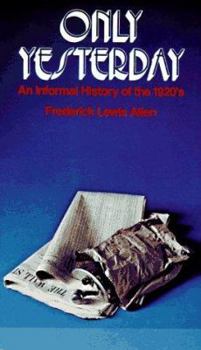Only Yesterday
Select Format
Select Condition 
Book Overview
"A perfectly grand piece of historical record and synthetic journalism." -- Chicago Daily TribuneFrom Frederick Lewis Allen, former editor-in-chief of Harper's magazine, comes a classic history of... This description may be from another edition of this product.
Format:Paperback
Language:English
ISBN:0060800046
ISBN13:9780060800048
Release Date:January 1957
Publisher:Harper Perennial
Length:312 Pages
Weight:0.41 lbs.
Dimensions:0.7" x 4.2" x 7.0"
Related Subjects
20th Century Business Business & Finance Business & Investing Economic History Economics Education & Reference History Labor & Industrial Relations Political Science Politics & Government Politics & Social Sciences Popular Economics Reference Social Science Social Sciences SociologyCustomer Reviews
3 ratings
Only Yesterday
Published by Thriftbooks.com User , 16 years ago
Only Yesterday is a very good source for information about living and financial conditions before and during the great depression of the 1930's. It shows a very close coolation between then and our current financial condition in the U.S.
During the 'Roaring 20's' they had it all!
Published by Thriftbooks.com User , 22 years ago
This is a wonderful little book (301 pages) about life in America in the decade between World War I (Armistice Day) and the Panic of October 29, 1929. Frederick Lewis Allen - a career writer-editor for various national publications (Atlantic Monthly, Century, Harper's, etc.) wrote this book in 1931. Thus, he provides a quick, fresh glance back upon this exciting period - the "Roaring 20's" - that he'd personally just experienced. Allen touches briefly, but poignantly, on all the important political, economical and social aspects of American life in these years. He includes capsule biographies of thepresidents: of Woodrow Wilson and his failure to successfully promote his `14 Point-based peace treaty and a League of Nations; of Warren G. Harding - handsome, personable, decent, but unaware, apparently, of the scandals taking place around him; of `silent' Calvin Coolidge and his era of prosperity; and of Herbert Hoover - well-meaning, but unable to find answers to the deteriorating economy and the approaching depression. Allen also describes the people, events and activities that impacted the lives of Americans in those years, including the fear of communism and socialism (`The Red Scare'), women's emancipation, the growing proliferation and influence of radio, the impact of new magazines dealing with the movies, adventure, romance and true confessions, the importance of newly created newspaper empires and chains, beauty contests, changing fashions, cosmetics, advertising, and new automobiles (Ford's Model A). He describes the country's heroes and its new obsessions and fads: Babe Ruth and baseball, Charles Lindbergh and aviation, Clarence Darrow and William Jennings Bryan doing verbal battle over religion at the Scopes' Monkey Trial in Dayton, Tennessee, Jack Dempsey, Gene Tunney and boxing, Bobby Jones and golf, Bill Tilden and tennis, flag-pole sitters, flappers, marathon dancing, scandals and crimes. Allen provides a wonderful chapter on prohibition - one of the really great issues of the era. The oft repeated message that man is destined to repeat past mistakes if he refuses toheed the lessons of history is demonstrated, I think, in this very chapter. Having succeeded in legislating this specific moral behavior (i.e., abstinence)the federal and state governments quickly learned that the people were not going to obey this law voluntarily, and that no one was going to be able to enforce it (sound like somebody's 'drug war'?!). Prohibition introduced - indeed, precipitated - a fascinating, new period in U.S. history: the country was soon awash with bootleggers, bathtub gin, speakeasies, gangwars, lawbreaking, hipflasks, sex, and exuberant hell-raising. Al Capone arrived in Chicago from New York, hired some 700 goons, armed them with shotguns and machine guns and tasked them with monopolizing Chicago's beer and liquor trade. When enormous profits started rolling in, the gangsters then moved into other lucrative business act
Captivating coverage of the "Roaring Twenties"
Published by Thriftbooks.com User , 26 years ago
The shame is that many modern history textbooks barely cover some material while diving into other periods of history. As an Advanced Placement United States History student during my junior year in high school (last year), I was given the opportunity to read Allen's work on the 1920s. Allen's journalistic style and thorough coverage of the events during the "Roaring Twenties" made this a fascinating read. The book is so well done that I had to occasionally stop and remind myself that this was written right after the decade addressed--it could have been written in the 1990s! The only major difficulty with this book (a minor one it is) is the explanation of how the stock market crashed (there are many numbers and examples cited), but it IS more thorough than most high school textbooks. What's also nice is that it covered the whole spectrum: politics, social atmosphere, the economy, etc. Many books focus only on one or two. This is a great resource for those who wish to understand what may be one of the most interesting decades of the twentieth century. It's a shame that "Still Yesterday" covering the 1930s is out of print-- it'd hate to miss more of Allen's wonderful work.






